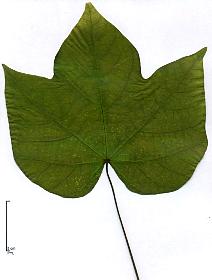Sterculia or Tree umbrella, Chinese Umbrella, Firmiana simplex, Sterculia 
tree of the family Sterculiaceae (Cocoa-Theobroma cocoa, Cola).
 Etymology: "tree umbrella" or " Chinese umbrella " because of its very big leaves. Its name Sterculia comes from Latin "Stercus" which indicates excrements and of Sterculius, the Roman God of toilets, in reference to the unpleasant smell emitted by the inflorescences of Sterculia foetida. Etymology: "tree umbrella" or " Chinese umbrella " because of its very big leaves. Its name Sterculia comes from Latin "Stercus" which indicates excrements and of Sterculius, the Roman God of toilets, in reference to the unpleasant smell emitted by the inflorescences of Sterculia foetida.
Origin: the genus includes about 200 species of deciduous or persistent trees, natives to Asia (mainly of China), Africa, South America, in tropical or subtropic zones.
Habitat: Firminia appreciates a sun-exposed site, sheltered from the wind.
Hardiness: zone 9 (it supports cold until -7 °C or 19 °F).
Height: 15 m tall.
Shape: globose crown.
Right trunk.
Bark: green, smooth, slightly streaked.
Very big leaves (40 cm), lobbed as those of the fig (to which they resemble), smooth on the top, clear and tomentose underneath. Long petiole.
Flowers: small, bell-like calyx, 5-lobed, grouped in panicles, of greenish yellow colour. They grow directly on branches (Firminia is a species "cauliflorous"), like the Judas tree, although in the Firminia, flowers push stuck at the end of stems which puts them outside of the crown. They appear in June, July according to climate.
The fruit is a pod containing some seeds. Instead of remaining closed up to the maturity, like in leguminous plants, the pods of Sterculia open to let seeds mature outside, unprotected (like in Gymnospermes, which are conifers).
Use: Sterculia or Firminia is used as ornamental tree or shade tree, due to its dense foliage. Its light and hard wood is searched for making musical instruments. Some species exude a gum (Sterculia setigera, native to sub-Saharan Africa, Sterculia tomentosa, native to Western Africa, Sterculia urens, native to India). The gum or Karaya has absorbent properties and hygroscopics. It is used in the pharmacopeia as excipient in the formulation of medicaments to treat gastroenteritises, problems of constipation and of intestinal transit.
|